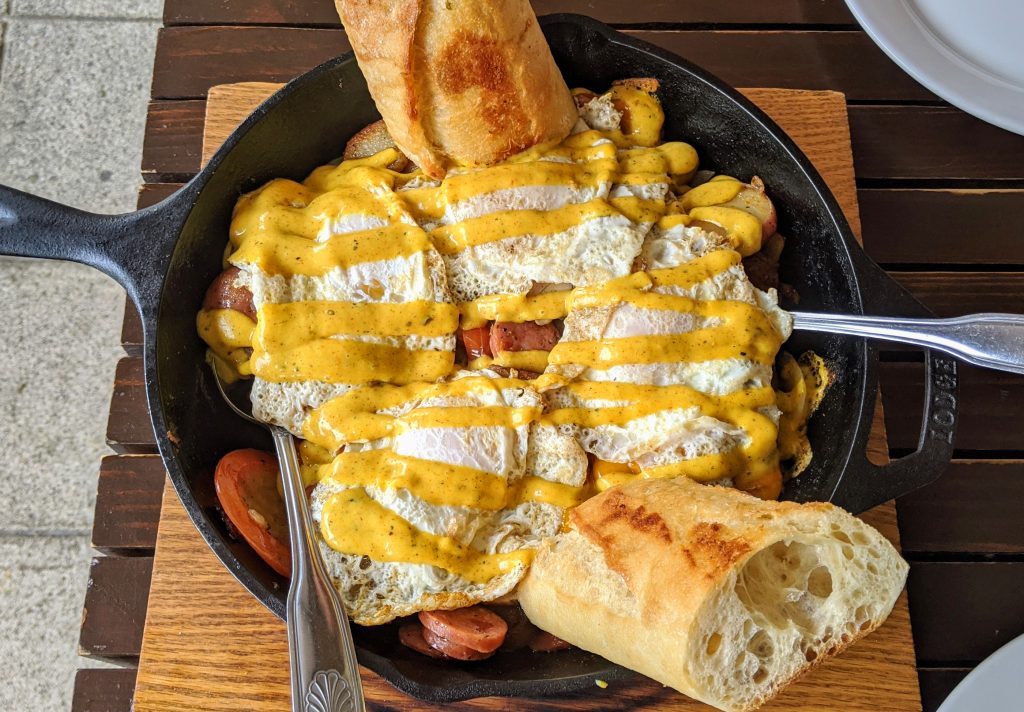Originally published in the June 2020 issue of (614) Magazine

Brunch has always been as much about the atmosphere as the meal itself. It’s an excuse to gather, indulgent by design. Even the most intentional takeout and delivery can’t duplicate the experience, and restaurants that consider it among their specialties seem even more empty than their vacant dining rooms suggest.
But the rush to return to some state of normalcy generated unintended controversy for Valter’s at the Maennerchor. The once bustling brunch spot and anytime standard bearer for Central European cuisine waded into treacherous waters when they announced intentions to reopen in early May for limited dining. Outspoken support was as fierce as online criticism, and the adage that there’s no such thing as bad publicity may never have been more wrong.
“Speculation at the time was that the governor might reopen restaurants on May 1, and we were ready to do so safely,” explained Valter Veliu. “When that turned out not to be so, I made some strong statements about the lack of certainty and the struggle shared by all restaurants.”
Veliu immigrated from Albania in 2005 drawn by the promise and opportunity he hoped to find over the horizon. Restaurants are often the first stop for new Americans, an industry built both on the talent and toil of the millions of immigrants it employs. But it’s also a classroom for learning a new language and culture, nuances that are all too easily missed in moments of crisis.
“What began as just a job became a passion. But my intentions aren’t and never have been political. I just try to help good people willing to help our community move forward,” he explained. “I soon recognized that even with the additional measures we planned to protect customers and staff, reopening too soon was not a risk worth taking, and I respect that.”
Frequent Facebook posts from the always animated Veliu have replaced the candid conversations his customers miss most. But between frustration and translation, his comments and context soon became decoupled, and declarations to reopen came across to many as defiance instead of desperation.
“In 2016, I was finally able to open my own restaurant with a lot of help from friends, and of course loans. My plan to pay off those loans was on track until the governor issued the order to shut everything down, including restaurants,” Veliu noted. “To be honest, I was a little concerned, but at the same time, it felt reasonable to quarantine to keep everyone safe.
Catering orders from essential employers have helped, as has some rent relief from his landlord. But like his fraternity of fellow restaurateurs, Veliu inevitably found his business sinking deeper into debt with no end in sight, and that same spirit of persistence soon boiled over, capturing the public’s attention, admiration, and ire. His Facebook page was soon flooded with sympathy, skepticism, and even a few threats—and an online apology didn’t seem to quell the controversy.
“My proposal to open the restaurant was with limited tables and patio dining, which is exactly how we opened as soon as we were allowed to do so safely,” he explained. “I’ve been involved in fundraisers supporting the efforts of community leaders who share my passion for helping people. I will always be thankful and appreciative for what this country has given me, and I’ve never taken it for granted.”
Valter Veliu’s success isn’t singular. It’s exactly the sort of story Columbus celebrates, one that illustrates the immigrant experience as one of triumph more than hardship. But the reality is that it’s rarely so simple. For every ethnic eatery that ekes out a faithful following, there’s a food truck one slow week away from folding up. The local restaurant scene still remains only slightly more supportive than it is unavoidably unforgiving.
Ironically, the same standards Veliu vowed to institute earlier match those required by the state to do so as safely as possible. He hopes this footnote fades and folks appreciate the uncertainty still facing restaurants, many of which may never return. Fortunately for Valter’s, loyalties aren’t so easily shaken and his first open weekend in months saw no shortage of returning clientele.
“We came a little earlier so there weren’t a ton of other people. But we put on our masks to walk in, and were escorted out to the patio where they seated guests at every other table,” recalled Mallery Grimm. She and her husband Darin live nearby and knew exactly where they would go for their first meal once restaurants reopened. “Valter came out with his mask on just to thank everyone for coming. I think we all were just excited to get out of the house and feel connected again.”
Takeout and delivery are still essential for restaurants to survive, and those with limited seating already are hit even harder. There’s also the expense of packaging, paper menus, and additional precautions that have kept some restaurants from reopening even though permitted for fear of losing more money than they take in. The entire industry is a long way from recovery, but brunch at Valter’s at the Maennerchor is still closer to normal than we were just weeks ago.
“My husband and I have been working from home since March and really haven’t seen that many people besides each other. Everyone was in good spirits just being out again,” she noted. “We had been doing takeout at least once or twice a week since this whole thing started to support our favorite restaurants, but it’s still not the same. There’s no substitute for a meal that comes out from the kitchen served in a hot skillet.” ▩
For more on Valter’s history, takeout and delivery options, and reservations, visit valtersatthemaennerchor.com